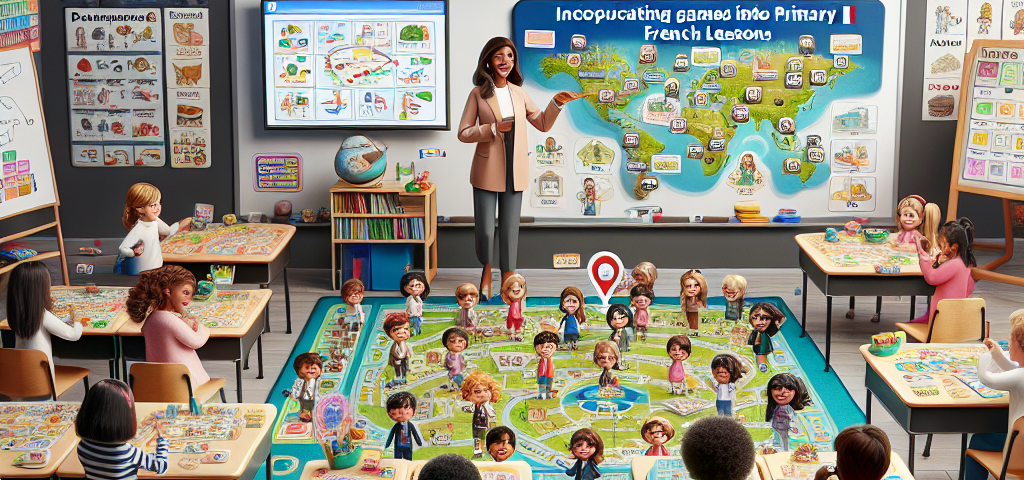
Cultural Enrichment: How French Secondary Schools Foster Global Citizenship
May 31, 2025
Understanding the Baccalauréat: What Every Student Needs to Know
May 31, 2025
Learning a new language can be a daunting journey, especially for young learners in primary school. To make the process enjoyable and effective, incorporating games into French lessons can create a vibrant and engaging atmosphere that boosts language acquisition. Here’s a look at the benefits of integrating games into primary French education and some practical strategies to do so.
The Benefits of Learning Through Play
-
Enhanced Engagement: Games naturally capture children’s attention and motivate them to participate. When lessons are gamified, students are more likely to remain engaged and interested in the material.
-
Improved Retention: Experiential learning, which includes playing games, helps students remember vocabulary and grammar rules more effectively. When children learn in a fun context, they are more likely to retain what they’ve learned.
-
Collaboration and Communication: Many games encourage teamwork and communication. As children work together to achieve a common goal, they practice their language skills in a supportive environment, learning from one another.
-
Confidence Building: Games often provide a low-stakes environment for students to practice their language skills. This boosts confidence, as children can take risks and make mistakes without the fear of harsh judgment.
- Cognitive Skills Development: Language games often require critical thinking, problem-solving, and decision-making. These cognitive processes enhance overall learning and can benefit students in all areas of their academic journey.
Effective Game Ideas for Primary French Lessons
1. Vocabulary Bingo
Bingo is a classic game that can easily be adapted for language learning. Create bingo cards with French vocabulary words, phrases, or images. As you call out the terms in French, students will mark them on their cards, reinforcing their understanding and recall of vocabulary.
Variation: Instead of calling out words, hold up flashcards or say phrases, and have students identify and mark them.
2. Simon Says (Jacques a dit)
This classic game can help students learn commands in French. The teacher takes on the role of "Simon" (Jacques) and gives commands in French, such as "Jacques a dit, touchez vos pieds" (Simon says, touch your feet). Students must listen carefully and follow the instructions, bolstering their listening skills and comprehension.
3. Memory Match
Create pairs of cards, with one card displaying a French word and the other showing the corresponding image or its English translation. Students take turns flipping two cards at a time, trying to find matching pairs. This game not only reinforces vocabulary but also encourages visual recognition.
4. Role-Playing Games
Encourage students to act out simple scenarios in French, such as ordering food at a café or shopping at a market. This approach allows learners to practice conversational phrases in context, boosting their speaking and listening skills.
5. Treasure Hunts
Design a treasure hunt where students must follow clues written in French. Each clue leads them to the next location, and as they solve each one, they practice reading comprehension and vocabulary. This can be done in the classroom or even outside.
6. Digital Games and Apps
Utilize technology to access a plethora of educational games and apps designed for language learning. Websites like Duolingo, Quizlet, and Kahoot offer interactive ways to practice vocabulary and grammar while keeping students engaged.
Tips for Successful Implementation
-
Balance Fun and Education: Ensure that the games directly relate to the learning objectives. The goal is to reinforce language skills while keeping the atmosphere enjoyable.
-
Encourage Participation: Make sure every student gets a chance to participate, catering to diverse learning styles and abilities.
-
Debrief After Games: After playing a game, take a moment to discuss what new vocabulary or structures students learned. This reinforces the learning and connects the activities to the curriculum.
- Switch It Up: Regularly introduce new games to maintain freshness in the lessons. Rotating games keeps students eager and excited for each lesson.
Conclusion
Incorporating games into primary French lessons not only makes language learning fun but also significantly enhances the educational experience. Games provide meaningful opportunities for communication, collaboration, and critical thinking, ultimately leading to improved language skills. By embracing the playful spirit of games, educators can create a dynamic and effective learning environment that inspires young learners to embrace the French language enthusiastically.

